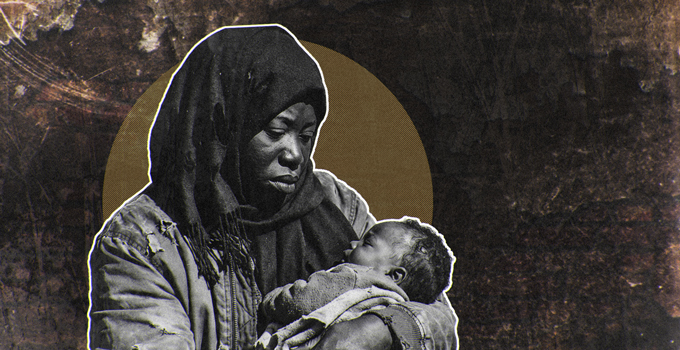Hassen is a 27-year old student from Burkina-Faso. He and his roommate share a house in Bab Jazira which they rent for 500 dinars a month. Hassen used to work nights to make ends meet. « Before the start of the crisis, I was able to pay my part of the rent by working nights as a security guard for a private company. But there hasn’t been work for a while now and I wasn’t able to manage with my roommate; we could neither pay rent nor even buy food », he tells Nawaat.

Still more precarious
Hassen’s situation is similar to that of many migrants who from one day to the next find themselves without a job. « Some weren’t paid for the last month of work, so they don’t even have any money to get by. Same for housekeepers and restaurant employees. They aren’t working any more. And some have children to support », says Mamadou, vice-president of the Association of Ivorians in Tunisia. Mamadou, who lives in Dar Fadhal (Soukra), explains, « These individuals are primarily afraid of being evicted for not paying their rent and finding themselves in the street. There is also a dire need for food and health services ».
Within certain Facebook groups, a number of individuals appeal for help on a daily basis, especially for food. Confronted with this humanitarian issue, many citizens and Tunisian associations or representatives of these Sub-Saharan communities have mobilized to help the most vulnerable.

In Dar Fadhal, Mamadou participates with members of his community to distribute aid: « We raised money to pay rent for certain individuals. But we have also received in-kind donations from migrant or Tunisian associations. In the neighborhood of Dar Fadhal, we are reaching out to residents in need to come get aid. For those who live a bit further away, we deliver aid donations ourselves », Mamadou tells us. He prefers to distribute only in-kind donations. « We can’t give money to everyone. This would be neither sufficient nor equitable », says Mamadou.
Tunisian solidarity
In the same neighborhood, Mamadou is also a representative of the Facebook initiative African Tunisia helps Sub-Saharans in Tunisia which was launched by three Tunisians. Fatma Laabidi is one of the instigators of this mobilization which extends help to migrants. « From the outset of the crisis, we observed that many migrants who usually shop in certain areas had disappeared. We also noticed that people in our entourage were in distress, which is where we got the idea for this mobilization. We began in our area in Ariana before launching contact points all over », she explains to Nawaat.
Many Tunisians responded to this call for donations. « For financial donations, we direct donors to carry out transfers with the Red Cross so that the transaction is legal. For in-kind donations, we collaborate with the NGO Tunisie Terre d’asile which has specific information about individuals in need. And we have contacts in each area in charge of distributing donations », she adds.

Fatma Laabidi highlights the extremely precarious situation of those who work as housekeepers, restaurant employees and in construction. « Many work for peanuts and don’t have social coverage. Their situation is irregular and they have to pay penalties for having overstayed their residency period. This crisis only makes such already fragile situations worse because these individuals weren’t able to put money aside to get them through the confinement period » she says sadly.
Beyond this precarity is the behavior of certain Tunisians. « In addition to the threat of being evicted from their homes, some individuals report that certain merchants have refused to sell them subsidized flour, oil and sugar under the pretext of rationing. Of course these cases constitute a minority but are no less scandalous », Fatma Laabidi says in dismay.
Other Tunisians have shown solidarity and understanding. Fatma Laabidi points out the outpouring of donations from individuals but also from businesses and localities. For Hassen and his roommate, Tunisians raised funds to cover their rent. And the mother of their landlord has taken it upon herself to feed them, he says.

Organizations and deputies mobilize
In support of this mobilization, a group of associations (Tunisian Forum for Economic and Social Rights (FTDES), Tunis Center for Migration and Asylum (CeTuMA), Lawyers without Borders (ASF)…) and parliamentary deputies have called to strengthen the protection of migrants. « To this day, in spite of initiatives launched by different civil society actors, Tunisia does not have a national program to inform these communities specifically and direct them to health care and other prevention services that are essential to stopping the pandemic throughout the country », their statement reads.
Signees exhort Tunisian authorities to « study alternatives to detaining refugees and migrants who are vulnerable to the illness and who are being held in the centers in El Ouardia and Ben Guerdane. These individuals have a higher risk of becoming gravely ill or dying in case of contamination ». Indeed, irregular migrants detained at the Reception and Orientation Center of El Ouardia held an open strike to denounce conditions at the shelter which are conducive to the spread of Coronavirus.

In this context, the signees are calling for an exceptional procedure to regularize migrants’ situations. « This responsibility responds to different requests from Tunisian human rights organizations and to concerns expressed on numerous occasions over the past several years by social partners with regards to the precarity and exploitation of irregular workers in Tunisia », they argue.
On April 7, Tunisia’s Ministers of the Interior, Social Affairs and Human Rights met to announce a series of measures concerning migrants. In this vein, they asked landlords to defer rent payments for the months of April and May. They also decided to not take into consideration legal residency periods, particularly for countries exempt from visa obligations, starting March 1 until the end of the health crisis in Tunisia and migrants’ countries of origin. The ministers furthermore announced the extension of visas until the end of the crisis.





iThere are no comments
Add yours